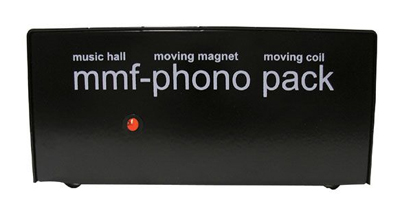You are reading the older HTML site
Positive Feedback ISSUE
18
march/april 2005
music hall
MMF Phono Pack
as reviewed by Ed Kobesky

|
ED KOBESKY'S SYSTEM
LOUDSPEAKERS
ELECTRONICS
SOURCES
CABLES
ACCESSORIES |
After a long drought, phono inputs are making a comeback on entry-level receivers, preamps, and integrated amplifiers. Many are more than adequate, and some are actually quite good. Meanwhile, on the higher end, there are plenty of megabuck phono stages to choose from. Between the two extremes is a vast chasm that's filled quite handily by the Music Hall MMF Phono Pack ($120). It's a handy addition to any mid-priced integrated amp or preamp that doesn't have a phono stage. Even higher-end audiophiles with a casual interest in vinyl playback should consider the Phono Pack before dropping $1000 or more on esoteric gear.
The Phono Pack has competition. It is most similar in execution to NAD's new PP-2 ($130), a redesign of their original PP-1 that now includes moving coil capability. Pro-Ject markets the excellent Phono Box ($120), a hideaway unit that, while small, is still difficult to tuck behind other components. Then there's the Thorens MM 001 ($170), the Parasound Zphono ($150), and Rotel's supremely capable RQ-970 ($200), a substantial design with internal power supply. So what makes the Phono Pack so special? First is its price—it can be had for as little as $100 from a number of sources. Second is the sound. Though corners were cut and compromises made to bring the Phono Pack in at such a low price, they're mostly forgivable. It's very good for the money.
The Phono Pack is made in China and arrives in a plain cardboard box—ideal for hiding your analog obsession from nosy postal carriers or tricking your wife into thinking you've ordered marital aids instead of audio gear. Inside is a decently made black box with a cheap wall-wart power supply. There's no power switch, which is fine since the Phono Pack sounds better when thoroughly warmed. There were no glaring assembly defects, aside from a slightly bent input connector for the AC jack. The instruction manual is a single sheet of paper, and the highest compliment I can give is that it's written in credible English.
On the rear panel is a three-position knob for switching between loading for 47K and 100 ohm moving magnet cartridges and also moving coils. A loud thud accompanies any change, so be careful. High-output moving coils should be treated like moving magnets—to do otherwise will overload the Phono Pack. Much as I like the Phono Pack, I wish its designers had concentrated solely on its moving magnet capabilities. Though I have no doubt it will perform serviceably with any cartridge, I'd urge those considering a low-output moving coil to audition something more ambitious.
I paired the Phono Pack with my Technics SL-1200Mk2 ($550) and Audio-Technica's remarkable AT-440ML ($220—review forthcoming). I hesitate to overanalyze the Phono Pack's performance, because doing so would imply that it has high-end pretensions. It doesn't. It sounds bright and a tad brittle. It's also less open than the phono stage in my NAD 3400 integrated amp, and far less detailed than my Rotel RQ-970 was. Quibbles aside, it's a solid, pleasant piece of gear that manages to convey the essence of analog.
On Ben Folds' Rockin' The Suburbs (Epic 61610), the Phono Pack got the vocals right and, despite a slight edge to the piano, conveyed the delicacy of Folds' witty musicianship. In the new 200-gram Classic Records pressing of Sarah McLachlan's Afterglow (Classic 2013), it revealed a lush recording with a quiet background and far greater depth than the Arista CD. Likewise, on Classic's re-release of Pete Townsend's first solo album, Who Came First (Classic 79189), it preserved the low-key charm of the subdued cuts while unleashing plenty of rock ‘n' roll fury on the tracks that go to eleven.
While the Phono Pack is quiet and efficient, it lacks the dynamic ability to satisfy hardcore classical music fans. Jazz fans may wish for a bit more heart and soul. Still, most listeners will find it satisfactory. Many may even consider it an overachiever because it delivers the elements of musicality, particularly timing and tonality. If Roy Hall stuck its guts inside a more substantial enclosure with a fancy faceplate, he could probably sell it for $300.
You can buy better performance by spending as little as $200 more (though $200 buys a lot of used records). You may also find subtle differences between the Phono Pack and its nearest competitors that make them worth a few extra greenbacks, but do you really want to waste your time comparing cheap phono preamps? At $120, the Music Hall MMF Phono Pack is a godsend for cash-strapped vinyl junkies or those with tiny but treasured record collections. It offers a taste of high-end analog magic for the price of a decent pair of interconnects, and as such, is highly recommended. Ed Kobesky
MMF Music Pack
Retail: $120
Music Hall Audio
web address:
www.musichallaudio.com
